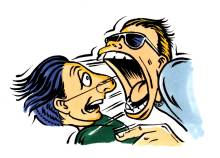R U Breaking the Law?...Harassment  In 1994, parliament passed the "Criminal Justice and Public Order Act". It states that it is a criminal offence to use abusive or insulting words or behaviour in a public place in a way that is intended to cause a person distress, alarm or harassment. It also states that it is an offence to put up a sign or poster that could be abusive or threatening in the same way. It was passed to protect people from being treated in this way because of their race, disability, sexuality, etc. Harassment is a crime, and if a case is reported to the police they are under obligation to investigate it and find those responsible. Statements from witnesses will make a case stronger, and the police will be more able to punish those involved. In 1994, parliament passed the "Criminal Justice and Public Order Act". It states that it is a criminal offence to use abusive or insulting words or behaviour in a public place in a way that is intended to cause a person distress, alarm or harassment. It also states that it is an offence to put up a sign or poster that could be abusive or threatening in the same way. It was passed to protect people from being treated in this way because of their race, disability, sexuality, etc. Harassment is a crime, and if a case is reported to the police they are under obligation to investigate it and find those responsible. Statements from witnesses will make a case stronger, and the police will be more able to punish those involved.
 Under the "Crime and Disorder Act 1998", offences that can be shown to be racially motivated now carry increased penalties. The local council can also intervene to help persons being racially harassed or attacked. They can prosecute those involved, get a court order stopping certain types of anti-social behaviour or if those responsible are council tenants they can have them evicted from their home. The police can also obtain court orders against anti-social behaviour. Under the "Crime and Disorder Act 1998", offences that can be shown to be racially motivated now carry increased penalties. The local council can also intervene to help persons being racially harassed or attacked. They can prosecute those involved, get a court order stopping certain types of anti-social behaviour or if those responsible are council tenants they can have them evicted from their home. The police can also obtain court orders against anti-social behaviour.
Stalking  In 1997, the "Protection From Harassment Act" was passed after a number of cases of men following women over a considerable period of time. It is now an offence for someone to behave in a way that they know, or should know, could be considered harassment or puts a person in fear of violence being used against them. For it to actually be an offence it must take place on at least two separate occasions. If found guilty, the offender faces a stay in prison and/or a fine. Someone who feels they are a victim of harassment can apply to court for an injunction. This orders that the offender must not come within a certain distance of the victims house or place of work. Someone who has been a victim of harassment can also try to claim compensation for the distress they have suffered, or money lost through time of work. In 1997, the "Protection From Harassment Act" was passed after a number of cases of men following women over a considerable period of time. It is now an offence for someone to behave in a way that they know, or should know, could be considered harassment or puts a person in fear of violence being used against them. For it to actually be an offence it must take place on at least two separate occasions. If found guilty, the offender faces a stay in prison and/or a fine. Someone who feels they are a victim of harassment can apply to court for an injunction. This orders that the offender must not come within a certain distance of the victims house or place of work. Someone who has been a victim of harassment can also try to claim compensation for the distress they have suffered, or money lost through time of work.
How to deal with it  How to deal best with harassment depends on what has actually happened. If it has only happened once and the person is someone you donít know, rather than get abusive yourself it might be best to try and ignore but you should still probably make a complaint, say to the police. If you get abusive and retalliate you could end up in a worse situation, particularly if you donít know the person and therefore donít know how they are going to react. How to deal best with harassment depends on what has actually happened. If it has only happened once and the person is someone you donít know, rather than get abusive yourself it might be best to try and ignore but you should still probably make a complaint, say to the police. If you get abusive and retalliate you could end up in a worse situation, particularly if you donít know the person and therefore donít know how they are going to react.
But if it is not an isolated incident or it is happening where you live itís important to go to the police. It could be a risk to your safety. If itís happening at school, college or at work try and sort it out with those concerned. If that is not possible or doesnít solve the problem, take it up with someone in authority. If you have suffered serious abuse or harassment, you might be able to claim compensation from the "Criminal Injuries Compensation Authority" Abusive Telephone Calls  Under the 1984 'Telecommunications Act', it is an offence to make threatening phone calls of any kind. This includes heavy breathing, insulting words and intimate questions. These carry a maximum sentence of six months imprisonment and a fine of up to £5,000. If you get a suspect phone call, do not lash out at or talk to the caller. Donít hang up but put the phone down for a few minutes. Then without checking to see if the caller is still there, hang up. If the phone rings again, pick it up but remain silent. A genuine caller will speak first. If the calls continue, report them to the police and BT. BT run a free help line on 0800 666 700. By dialling 1471 after a suspicious call you can usually obtain the number of the phone from which you have just been called. Under the 1984 'Telecommunications Act', it is an offence to make threatening phone calls of any kind. This includes heavy breathing, insulting words and intimate questions. These carry a maximum sentence of six months imprisonment and a fine of up to £5,000. If you get a suspect phone call, do not lash out at or talk to the caller. Donít hang up but put the phone down for a few minutes. Then without checking to see if the caller is still there, hang up. If the phone rings again, pick it up but remain silent. A genuine caller will speak first. If the calls continue, report them to the police and BT. BT run a free help line on 0800 666 700. By dialling 1471 after a suspicious call you can usually obtain the number of the phone from which you have just been called.
Click on these links to find the law in these different areas:
|
|

 In 1994, parliament passed the "Criminal Justice and Public Order Act". It states that it is a criminal offence to use abusive or insulting words or behaviour in a public place in a way that is intended to cause a person distress, alarm or harassment. It also states that it is an offence to put up a sign or poster that could be abusive or threatening in the same way. It was passed to protect people from being treated in this way because of their race, disability, sexuality, etc. Harassment is a crime, and if a case is reported to the police they are under obligation to investigate it and find those responsible. Statements from witnesses will make a case stronger, and the police will be more able to punish those involved.
In 1994, parliament passed the "Criminal Justice and Public Order Act". It states that it is a criminal offence to use abusive or insulting words or behaviour in a public place in a way that is intended to cause a person distress, alarm or harassment. It also states that it is an offence to put up a sign or poster that could be abusive or threatening in the same way. It was passed to protect people from being treated in this way because of their race, disability, sexuality, etc. Harassment is a crime, and if a case is reported to the police they are under obligation to investigate it and find those responsible. Statements from witnesses will make a case stronger, and the police will be more able to punish those involved. Under the "Crime and Disorder Act 1998", offences that can be shown to be racially motivated now carry increased penalties. The local council can also intervene to help persons being racially harassed or attacked. They can prosecute those involved, get a court order stopping certain types of anti-social behaviour or if those responsible are council tenants they can have them evicted from their home. The police can also obtain court orders against anti-social behaviour.
Under the "Crime and Disorder Act 1998", offences that can be shown to be racially motivated now carry increased penalties. The local council can also intervene to help persons being racially harassed or attacked. They can prosecute those involved, get a court order stopping certain types of anti-social behaviour or if those responsible are council tenants they can have them evicted from their home. The police can also obtain court orders against anti-social behaviour. In 1997, the "Protection From Harassment Act" was passed after a number of cases of men following women over a considerable period of time. It is now an offence for someone to behave in a way that they know, or should know, could be considered harassment or puts a person in fear of violence being used against them. For it to actually be an offence it must take place on at least two separate occasions. If found guilty, the offender faces a stay in prison and/or a fine. Someone who feels they are a victim of harassment can apply to court for an injunction. This orders that the offender must not come within a certain distance of the victims house or place of work. Someone who has been a victim of harassment can also try to claim compensation for the distress they have suffered, or money lost through time of work.
In 1997, the "Protection From Harassment Act" was passed after a number of cases of men following women over a considerable period of time. It is now an offence for someone to behave in a way that they know, or should know, could be considered harassment or puts a person in fear of violence being used against them. For it to actually be an offence it must take place on at least two separate occasions. If found guilty, the offender faces a stay in prison and/or a fine. Someone who feels they are a victim of harassment can apply to court for an injunction. This orders that the offender must not come within a certain distance of the victims house or place of work. Someone who has been a victim of harassment can also try to claim compensation for the distress they have suffered, or money lost through time of work. How to deal best with harassment depends on what has actually happened. If it has only happened once and the person is someone you donít know, rather than get abusive yourself it might be best to try and ignore but you should still probably make a complaint, say to the police. If you get abusive and retalliate you could end up in a worse situation, particularly if you donít know the person and therefore donít know how they are going to react.
How to deal best with harassment depends on what has actually happened. If it has only happened once and the person is someone you donít know, rather than get abusive yourself it might be best to try and ignore but you should still probably make a complaint, say to the police. If you get abusive and retalliate you could end up in a worse situation, particularly if you donít know the person and therefore donít know how they are going to react.
 Under the 1984 'Telecommunications Act', it is an offence to make threatening phone calls of any kind. This includes heavy breathing, insulting words and intimate questions. These carry a maximum sentence of six months imprisonment and a fine of up to £5,000. If you get a suspect phone call, do not lash out at or talk to the caller. Donít hang up but put the phone down for a few minutes. Then without checking to see if the caller is still there, hang up. If the phone rings again, pick it up but remain silent. A genuine caller will speak first. If the calls continue, report them to the police and BT. BT run a free help line on 0800 666 700. By dialling 1471 after a suspicious call you can usually obtain the number of the phone from which you have just been called.
Under the 1984 'Telecommunications Act', it is an offence to make threatening phone calls of any kind. This includes heavy breathing, insulting words and intimate questions. These carry a maximum sentence of six months imprisonment and a fine of up to £5,000. If you get a suspect phone call, do not lash out at or talk to the caller. Donít hang up but put the phone down for a few minutes. Then without checking to see if the caller is still there, hang up. If the phone rings again, pick it up but remain silent. A genuine caller will speak first. If the calls continue, report them to the police and BT. BT run a free help line on 0800 666 700. By dialling 1471 after a suspicious call you can usually obtain the number of the phone from which you have just been called.